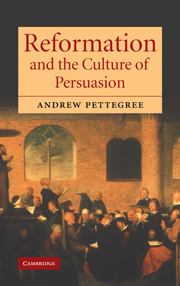8 - New solidarities
Published online by Cambridge University Press: 04 December 2009
Summary
By 1580 Europe's confessional boundaries were essentially fixed. The British kingdoms of England and Scotland were secure under the control of Protestant monarchs; in France a Calvinist minority was entrenched, but it was clear the nation would never be converted. In the Netherlands the Protestant north would never be recovered by Spain; the southern provinces would gradually assume a distinct Catholic identity. In Germany the oldest Lutheran states were now entering their third generation since the adoption of a Protestant church order. The Scandinavian kingdoms had also settled to life with a Lutheran state church. Only in eastern Europe would the tides shift in a significant manner, as the Habsburg victories of the 1620s allowed the suppression of the previously dominant Protestant estates of Hungary and Bohemia. That was for the future. For the moment the reality of a confessionally divided Europe was a generally accepted fact of European life and politics.
It would be wrong, however, to believe that this relative stability, so clear in retrospect, had calmed the passions raised by the first Reformation conflicts. On the contrary, relations between the faiths remained fractious and unstable, coloured above all by fear. On the Protestant side, this was understandable enough. In 1580 memories of the terrible massacres of Paris (1572) and Antwerp (1576) were still fresh, a reminder of Catholic perfidy, and the imminent danger that hard-won freedoms could still be dashed away.
- Type
- Chapter
- Information
- Reformation and the Culture of Persuasion , pp. 185 - 210Publisher: Cambridge University PressPrint publication year: 2005

